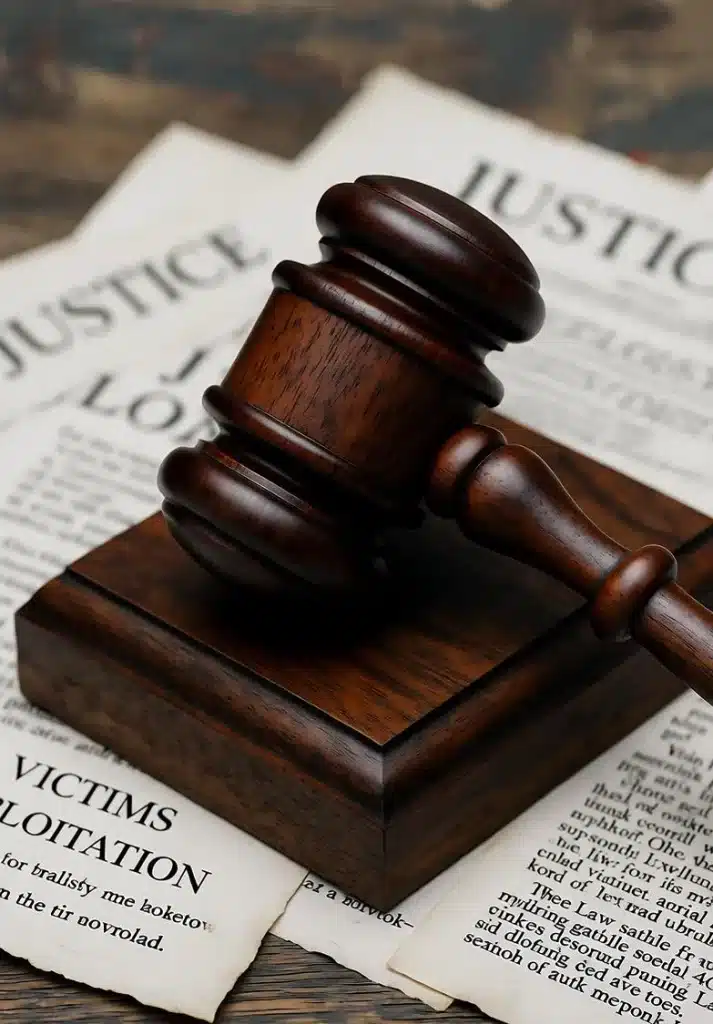- Home
- Sexual Abuse
- Signs of Sexual Abuse
- Sexual Exploitation And Abuse
Sexual Exploitation And Abuse
- February 18, 2026
-
Sarah Miller
- Fact Checked By Our Attorneys
Sexual exploitation and abuse (SEA) refer to situations where power and vulnerability are misused for sexual purposes. This includes sexual exploitation, where an individual takes advantage of another person’s vulnerability for sexual gain, and sexual abuse, which involves sexual acts carried out without informed consent.
Both forms are a grave violation of trust and human dignity, often leaving survivors with deep and lasting harm. Child sexual exploitation is especially devastating, as children are unable to give consent and are more vulnerable to manipulation and coercion.
If you or someone you love has been affected, you can report sexual exploitation and seek justice. Contact us today for a free, confidential case review to understand your rights and legal options.
No Win, No Fee. Let the Best Sex Abuse Attorneys Fight for your Compensation!
Key Takeaways:
Sexual exploitation and abuse (SEA) involve serious violations of trust, consent, and human dignity, including both the misuse of power for sexual gain and acts committed without informed consent.
Survivors often face deep emotional and physical harm, such as PTSD, depression, shame, chronic stress, and challenges with trust and relationships.
Children are especially vulnerable to sexual exploitation, with long-term consequences that can last into adulthood.
Legal accountability is possible, Free, confidential case reviews through Legal Claim Assistant to explore their rights and seek justice.
Find out your eligibility in 2 minutes
If your child has been a victim of sexual abuse, you are not alone. Many families face the same fear, pain, and search for justice. Our team can connect you with experienced child sexual abuse attorneys who understand these sensitive cases, protect your child’s rights, and guide your family through filing a legal claim for the compensation and accountability you deserve.
Begin your free and confidential case review today.

What Is Sexual Exploitation and Abuse?
Sexual exploitation and abuse (SEA) refers to any situation where a person is manipulated, coerced, or forced into sexual activity, or where their vulnerability is taken advantage of for sexual gain. The United Nations defines sexual exploitation as the abuse of a position of vulnerability, differential power, or trust for sexual purposes, including profiting monetarily, socially, or politically from another person’s sexual behavior. This definition emphasizes that SEA is not just a violation of physical boundaries, but also a profound abuse of trust and power.
Unlike harassment, which may involve offensive comments, unwanted attention, or intimidation, sexual exploitation and abuse involves actions that are coercive, forced, or manipulative. For example, a school staff member offering grades, promotions, or special privileges in exchange for sexual favors constitutes sexual exploitation, whereas direct sexual assault without consent is classified as sexual abuse.
Sexual exploitation and abuse can occur against children, adolescents, and adults, though children are particularly at risk because of their limited ability to understand, resist, or report abuse. Victims may feel threatened, manipulated, or isolated, making it difficult for them to come forward.
It is important to recognize that SEA is never the victim’s fault and that anyone, regardless of gender, age, or background, can be targeted. Understanding the meaning and scope of sexual exploitation and abuse is the first step toward protecting oneself, recognizing the signs, and seeking support or legal recourse.
“Sexual exploitation and abuse are grave violations of human rights that undermine dignity, destroy trust, and demand accountability from all levels of society.”
Difference Between Sexual Exploitation and Sexual Abuse
Many people ask What is the difference between sexual exploitation and abuse? While the two overlap, they are not the same.
- Sexual exploitation occurs when someone uses their authority, or position to pressure or coerce another person into sexual activity in exchange for money, favors, opportunities, or basic needs. This often includes child sexual exploitation, where minors are tricked into providing sexual acts, sharing sexually explicit images, or appearing in videos. The person being exploited may feel they have no choice because of promises, or manipulation.
- Sexual abuse, on the other hand, involves direct acts of sex violence without permission. This includes unwanted sexual contact, enforced acts, or any violation of bodily autonomy. Abuse may happen within families, schools, communities, or online environments where perpetrators use threats or deception to gain control.
While both are forms of sexual violence, exploitation is often tied to manipulation, or coercion, whereas abuse is a direct violation of consent through violent or enforced acts.
No Win, No Fee. Let the Best Sex Abuse Attorneys Fight for your Compensation!
Examples of Sexual Exploitation and Abuse
Sexual exploitation and abuse can occur in many different environments, and it often takes place in spaces where victims should feel safe. In institutional settings such as schools, foster care homes, churches, summer camps, and youth sports programs, perpetrators may use their authority or position of trust to manipulate or coerce people into harmful situations.
Beyond these physical spaces, the rise of technology has fueled online sexual exploitation and cyber abuse, where victims are groomed in chat rooms or through social media applications, manipulated into sharing sexually explicit images, or threatened with sextortion. Abusers frequently use devices and computers to trick or isolate victims, making it difficult for them to seek help.
Another devastating form of exploitation is trafficking, where children and adults are forced or deceived into sexual activity in exchange for money, food, protection, or survival. These acts of sexual misconduct show that exploitation can occur in schools, communities, and digital spaces, highlighting the urgent need for prevention, protection, and clear reporting procedures.
Online Sexual Exploitation Tips for Safety
Online sexual exploitation occurs when abusers target children, teens, or vulnerable adults through devices, social media platforms, apps, or chatrooms. This can include sharing sexually explicit images, sextortion, or manipulating victims into sending videos. To protect yourself or children, it is important to establish strong online safety practices.
Limit sharing personal information or images online, enable privacy settings on social media accounts, and monitor online interactions for signs of manipulation or coercion. Educate children and teens about the risks of communicating with strangers and encourage open conversations about uncomfortable interactions. Reporting suspicious behavior to authorities, app platforms, or specialized hotlines can prevent further abuse.
FREE!
Find out if you're eligible and may be eligible for compensation.
Get your Free Case Review and Maximize You Payout With the Help From Legal Claim Assistant.
Child Sexual Exploitation and Abuse
Many people wonder, what is child sexual exploitation and abuse? It occurs when a child is coerced, or forced into sexual activity, often by someone they know and trust. Children are particularly vulnerable because of their age, dependence on adults, and limited ability to recognize threats. Grooming is a common tactic, where perpetrators use gifts, flattery, or threats to control before exploiting a child.
Increasingly, this happens online through apps, chat rooms, and social media, where children are manipulated into sharing private images or videos that may later be used as evidence of abuse or to maintain control over the victim.
The consequences for children are devastating, with long-term trauma that may include depression, anxiety, difficulties in forming healthy relationships, and struggles with trust and self-worth. According to the United Nations, preventing child exploitation requires a global response that prioritizes protection, accountability, and support.
“Sexual exploitation and abuse are unacceptable acts that violate human dignity and must be confronted with zero tolerance, justice, and unwavering support for survivors.”
Recognizing Grooming and Coercion
Grooming is a process where an abuser gradually builds trust with a child to manipulate or coerce them into sexual activity. It often begins subtly, with compliments, gifts, or special attention, and may escalate to sexualized behavior or requests. Coercion can take many forms, including threats, fear, or emotional manipulation. Children may not immediately recognize the danger, and they may feel isolated, confused, or pressured to comply.
Signs of grooming include secretive communication, sudden withdrawal from friends or family, changes in online behavior, or unexplained gifts. Understanding these tactics is essential for parents, caregivers, and educators to intervene early.
Psychological and Physical Impact
The impact of being sexually exploited or abused extends far beyond the initial incident, often leaving them with long-lasting emotional and physical scars. Many experience post-traumatic stress disorder (PTSD), depression, anxiety, shame, and struggles with self-worth, which can affect their ability to feel safe in everyday life. Physical consequences are also common, ranging from sexually transmitted infections (STIs) and unintended pregnancy to chronic stress-related health problems.
For many victims, the trauma affects their relationships as well, making it difficult to trust partners, build healthy connections with peers and friends, or maintain confidence in their own boundaries. These psychological and physical harms can appear immediately or surface years later, showing just how deeply abuse is committed against both the mind and body.
Recognizing the signs of sexual abuse early and ensuring survivors receive proper support are critical steps toward recovery from further harm.

Legal Definitions and Accountability
When it comes to sexual exploitation and abuse, the law defines and prosecutes these crimes differently depending on the state and the circumstances. Variations in state laws across the U.S. mean that what is considered a criminal offense in one jurisdiction may carry different processes or timelines in another.
Survivors may pursue accountability through criminal charges, where offender face prosecution by the state, or through civil lawsuits, which seek compensation for the harm committed. A key factor is the statute of limitations, which places time limits on when they can conduct legal action; however, many states have recently expanded these timelines to allow more victims to come forward. Importantly, accountability does not rest solely on the individual abuser.
Institutions such as hurches, employers, and even government offices can be held responsible when they fail to prevent people or ignore evidence of abuse.
“Sexual exploitation and abuse are violations of fundamental human rights that demand urgent action, accountability, and a survivor-centered approach in every response.”
Understanding Institutional Responsibility
Institutions such as schools, churches, sports organizations, and foster care facilities have a legal and moral responsibility to protect individuals from sexual exploitation and abuse. When abuse occurs within these settings, institutions may be held accountable if they failed to prevent the misconduct or ignored reports. Policies such as staff screening, background checks, and mandatory reporting are crucial to reduce risk.
Several landmark cases have shown that institutions can face civil lawsuits for negligence, including failures to train staff, supervise personnel, or respond to complaints appropriately. By understanding institutional responsibility, peoples can seek justice not only from perpetrators but also from organizations that allowed the abuse to occur. Holding institutions accountable also promotes systemic change, creating safer environments for future victims.
How to Prevent Sexual Exploitation and Abuse
Preventing sexual exploitation and abuse requires coordinated efforts from parents, schools, youth organizations, and the broader community. Parents can start by having open conversations about consent, boundaries, and healthy relationships, educating children about the risks of online interactions, and monitoring their device and social media use.
Schools and youth organizations should implement robust staff training programs, background checks, and clear reporting procedures to ensure that any suspicious behavior is identified and addressed promptly. Youth organizations can also educate participants about recognizing grooming tactics and encourage peer accountability in safe and structured ways.
Online safety is particularly important for children and teens, as many perpetrators exploit digital platforms to manipulate or coerce victims. Encouraging the use of privacy settings, avoiding sharing personal information or explicit images, and teaching children to recognize inappropriate communication are crucial steps. Parents and guardians should regularly review apps and devices, stay informed about online trends, and create an environment where children feel comfortable reporting uncomfortable encounters.
Community programs and whistleblower protections play a vital role in reducing sexual exploitation and abuse. Local initiatives, neighborhood watch programs, and advocacy groups can raise awareness, provide training, and establish safe channels for reporting misconduct. Whistleblower protections ensure that staff or community members who report abuse can do so without fear of retaliation, promoting accountability and transparency within institutions.
Reporting and Seeking Justice
If you or someone you know suspects or has experienced sexual exploitation or abuse, taking the right steps quickly can make a major difference. Reporting directly to police is often necessary when a crime has been committed, especially if a child or vulnerable person is at risk. However, survivors also have the option of seeking confidential legal consultation, which allows them to explore their rights without immediately entering the criminal system.
Consulting with a sex abuse lawyer can provide clarity on whether civil action is possible, including the opportunity to hold both offender and institutions accountable. They may face challenges with timelines, missing evidence, or fear of retaliation, but experienced attorneys can guide them through these obstacles.
It is also important to recognize the difference between law enforcement procedures and private legal support both can play a role in delivering justice, but civil claims often empower them by seeking compensation and institutional change.
Support and Resources for Survivors
Survivors of sexual exploitation and abuse should never feel that they have to navigate recovery alone. Immediate help is available through crisis hotlines, survivor support networks, and community-based organizations that provide safety and guidance in moments of need. Therapy and counseling play a vital role in trauma recovery, helping individuals process painful experiences, rebuild self-worth, and strengthen relationships affected by abuse.
Beyond emotional healing, survivors may also need practical support in addressing the instances of harm and holding perpetrators accountable. At Legal Claim Assistant, we provide a free complete case review and connect them with experienced attorneys who understand the complexity of these cases.
Recovery and Healing for Survivors
Healing from sexual exploitation and abuse is a gradual process that involves both emotional and psychological recovery. Survivors benefit from therapy or counseling, including trauma-informed approaches like cognitive behavioral therapy or group sessions with peers who have had similar experiences. Engaging in safe social support networks, practicing self-care, and establishing boundaries can also aid recovery.
Many of them find empowerment through education about their rights and by participating in survivor advocacy programs. Recovery is not linear, and setbacks are normal, but with professional guidance and a supportive environment, survivors can rebuild trust, regain confidence, and reclaim control over their lives. Legal assistance through free case reviews can also help them take action, reinforcing both justice and personal empowerment.
FREE!
Find out if you're eligible and may be eligible for compensation.
Get your Free Case Review and Maximize You Payout With the Help From Legal Claim Assistant.
Frequently Asked Questions
What is the difference between harassment and exploitation?
Harassment usually involves unwanted verbal or physical behaviour that creates a hostile environment, while exploitation occurs when a person uses power or vulnerability to coerce sexual acts or favors. Both are harmful, but exploitation carries a deeper violation of consent and dignity.
What is the UN definition of sexual exploitation?
According to the United Nations, sexual exploitation means any actual or attempted abuse of a position of vulnerability, differential power, or trust for sexual purposes. This includes profiting monetarily, socially, or politically from the sexual exploitation of another person.
How do we prevent sexual exploitation and abuse?
Prevention efforts focus on education about consent, training staff in schools and organizations, stronger community vigilance, and safe online practices to protect vulnerable people. Reporting systems, whistleblower safety, and survivor-centered policies are also critical for reducing future abuse.
Who can be held accountable for sexual exploitation and abuse?
Accountability applies to both individuals and institutions. Perpetrators who directly commit abuse can face criminal charges, while institutions such as schools, churches, or employers may be held responsible if they ignored evidence, failed to act, or created unsafe environments where abuse could occur.
Take Action Today
If you or somebody you care about has been affected by sexual exploitation or abuse, know that help is available and you do not have to face this alone. Survivors deserve safety, justice, and the opportunity to heal. Learning to recognize the signs of sexual abuse is the first step, but conduct action is what truly makes a difference.
At Legal Claim Assistant, we offer a free, confidential case review to connect survivors with experienced attorneys who understand these sensitive cases. Whether the abuse happened recently or in the past, your status as a survivor does not define your future you have the right to seek justice and support. Reach out today and take the first step toward recovery and accountability.
You Deserve Justice. Let Us Help.
Speak with a trusted sexual abuse attorney who will stand by your side, protect your privacy, and fight for the compensation you deserve.
No Win, No Fee. Let the Best Sex Abuse Attorneys Fight for your Compensation!
Under 1 Minute
100% Free
Expert-Reviewed
Private & Secure
© 2025 Legal Claim Assistant. All Rights Reserved.
Terms of Service | Privacy Policy | Contact Us | Marketing Partners
Related Article

How a Drunk Driving Accident Attorney Can Help After a Crash

